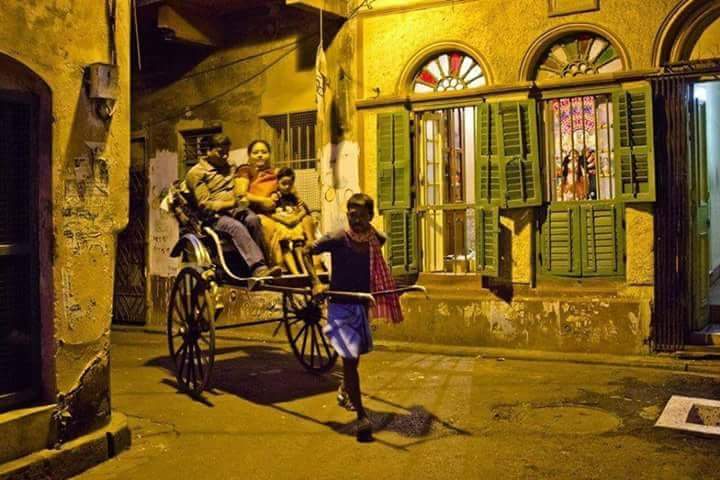Language- Bengali
Cast- Paran Bandopadhyay, Parambrata Chattopadhyay, Sohini Sarkar, Arun Guhathakurta and others
Release date- 13th May 2016
I admire Kaushik Ganguly’s prowess of picking up seemingly unexciting subjects and spinning a yarn around them. When Shabdo was released, I wondered how a foley artist’s profession made for an engaging plot. I realized it when I watched the film. I trust Kaushik with this skill and this is the reason why he is able to keep coming with new stories and never needs to fall back on literature.
Cinemawala is a tale of father-son conflict on the backdrop of a closed single-screen theatre in a village. Pranabendu Das (Father- Paran Bandopadhyay) is the owner of the theatre which has had its share of glory in the golden years of Bengali cinema. He finds sustenance from his family business of fish wholesale but refuses to let his undying love for cinema be defeated by his present. So he spends almost the entire day in the office of his theatre Kamalini, reminiscing the better days of Bengali cinema, punctuated with anecdotes, with his sole companion, the jobless projectionist of the theatre- Hari (Arun Guhathakurta). The session stretches till late evening over drinks. Kamalini is named after his wife (Alaknanda Roy) who left his family not being able to cope with his husband’s obsession for cinema with little care for a family life. Pranabendu’s son (Parambrata) doesn’t share his father’s ethics and values and is working hard to grow his business of illegal CDs and DVDs of current movies. He hates his father’s fish business and wants to run his family on his own. He needs money as his wife is pregnant. The father and son’s views on reviving the theatre don’t meet and they don’t see eye to eye. The son’s wife (Sohini Sarkar) is torn between the father and son.
With his finesse, Paran is a treat to watch as the brilliantly understated Pranabendu Das. Being one of the gifted veterans in the business, his acting prowess gets redemption in the well-written protagonist’s role of a ‘cinemawala’ (movie merchant). Pranabendu’s passion for cinema, for which he sacrifices a family life, is exemplary. Parambrata wonderfully matches up to him in a nuanced portrayal of the shrewd son who is desperate to come out of his father’s shadow (so much so that he buys a projector by selling jewellery gifted to his wife and uses it in illegal screening of movies in the village fair). On the other hand, he is good as the husband who loves his wife. Sohini is apt as the naïve wife who silently does her best to keep the family together. Arun Guhathakurta, another fine talent, is perfect as the old Hari who has undeterred loyalty to his master and deep attachment with the celluloid projector he used to operate. Lama is good in a small role as Param’s business partner with speech issues.
 |
| Paran Bandopadhyay |
 |
| Parambrata Chattopadhyay |
Kaushik’s writing and deft direction touch upon the grave crisis of survival for the single screen theatres and the threat of piracy as one of the primary reasons for it. The well-etched characters crafted by him complimented by the minimal yet effective dialogue has enabled him to use the actors’ fine expressions in close shots and bring out the ideological conflict between the father and the son in flesh and blood. The fine moments like the heartbroken Pranabendu looking out of his office window as the buyer of his defunct projector is taking it out, or the hurt caused by his son at home that makes him throw away the fish he picked up for his pregnant daughter-in-law will be etched in the mind long after the film is over. The film underscores an unknown theatre owner’s passion for and understanding of cinema- qualities those are essential in running the business of cinema. The climax is imaginative with a touch of surrealism.
It is indeed part of Kaushik’s best work. The film also underscores the fact that Kaushik is a ‘cinemawala’ too, who keeps coming back to us with finely crafted films of different flavours that we savour.
Soumik Halder’s camera and Tanmoy Chakraborty’s art direction have helped create the laidback life in the village and its occasional merry-making like the fair (Poush mela) and the run-down theatre (especially the old world office). Indradip Dasgupta’s minimal background score is effective in carrying the poignant scenes. The editor’s job (Subhojit Singha) is well done too as the film never drags in its compact screen time of 105 minutes.
Cinemawala celebrates the nostalgia around the cinema which may inspire us in the audience to go to the theatre more often to watch the movies we desire to, shunning the easy modes of watching a movie available these days. After all, a film is meant for the big screen (As Pranabendu exclaims, “Eta cinema. Eta big screen”). I only wish there was a ray of positivity in the film about the future of the cinema business. Though it is an uphill struggle to run a single screen theatre these days, more so in the rural areas, all is not over yet.
(Parambrata's picture- sourced from the film's Facebook page)
#Cinemawala #BanglaCinema #KaushikGanuly #Parambrata
If you liked reading the post, you may visit this blog's Facebook page (click on the link) and hit the 'Like' button to stay connected with the future updates on this blog and more on the page.































